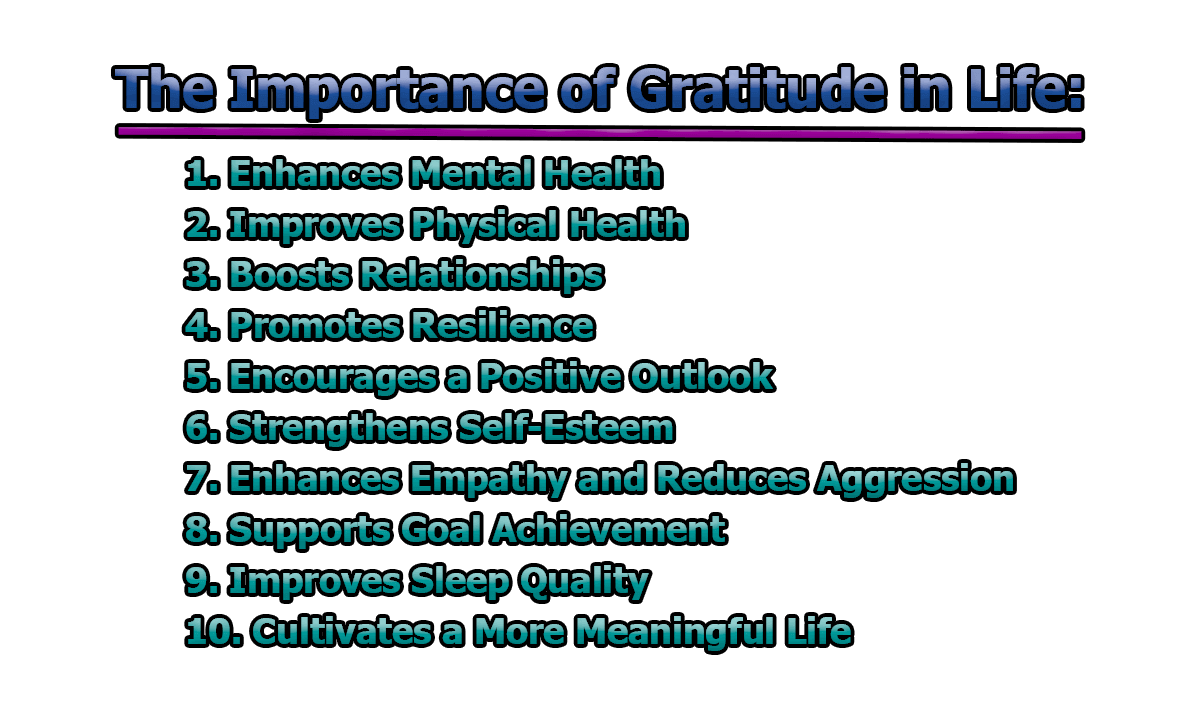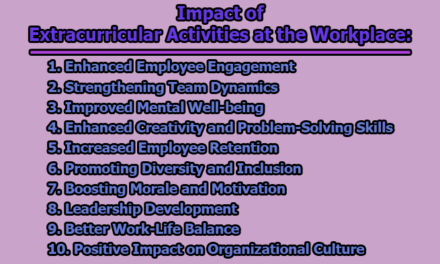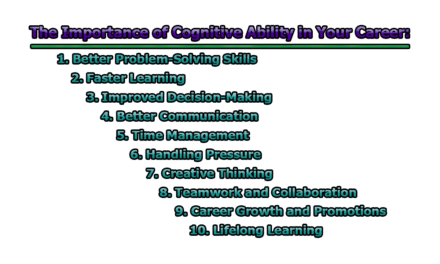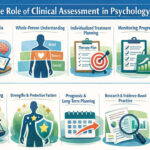The Importance of Gratitude in Life:
Gratitude, defined as the quality of being thankful and the readiness to show appreciation, has been extensively studied across disciplines, including psychology, philosophy, and even neuroscience. It is more than just saying “thank you”—it’s a powerful emotion and mindset that can significantly influence our mental, emotional, and physical well-being. Here, we will explore the importance of gratitude in life.
1. Enhances Mental Health: Gratitude has a profound effect on our mental well-being. When individuals consciously practice gratitude, they tend to experience fewer symptoms of depression and anxiety, and greater levels of happiness and life satisfaction.
Example: In a study conducted by Emmons and McCullough (2003), participants were divided into three groups. One group wrote about things they were grateful for each week, the second group wrote about daily hassles, and the third group wrote about neutral events. After 10 weeks, the gratitude group reported significantly higher levels of optimism and felt better about their lives. They also experienced fewer symptoms of depression.
The act of focusing on positive aspects—even in difficult times—shifts the brain’s attention away from negative thoughts. This shift creates a positive feedback loop that supports emotional resilience and mental stability.
Practical Application: Keeping a gratitude journal, where one writes down three things they are thankful for each day, is a simple yet effective tool to improve mental health. Even reflecting on small things like a kind word, a meal, or a sunny day can shift emotional balance over time.
2. Improves Physical Health: Gratitude is not only good for the mind but also for the body. Numerous studies have linked gratitude with better physical health, including lower blood pressure, stronger immune systems, and fewer aches and pains.
Example: In a longitudinal study, Hill et al. (2013) found that grateful people are more likely to engage in health-promoting behaviors such as regular exercise, healthy eating, and attending medical check-ups. Over time, these behaviors translate into better physical health outcomes.
Additionally, gratitude can lower levels of cortisol (a stress hormone) and contribute to improved heart rate variability, both of which are indicators of reduced stress and better cardiovascular health.
Practical Application: Practicing gratitude before bed has been shown to improve sleep quality. For instance, writing down things you are thankful for can calm your thoughts, reduce worry, and help you fall asleep faster and sleep more deeply (Wood et al., 2009).
3. Boosts Relationships: Gratitude plays a vital role in building and maintaining strong relationships. Expressing appreciation to others can strengthen social bonds, increase trust, and promote feelings of connection and belonging.
Example: A study by Algoe, Haidt, and Gable (2008) found that individuals who expressed gratitude to their romantic partners not only felt more positively toward their partners but also experienced higher satisfaction in the relationship. Similarly, gratitude in the workplace, such as thanking a colleague for their support, fosters a positive work environment and improves team cohesion.
When people feel appreciated, they are more likely to engage in kind, cooperative behavior, which creates a ripple effect of goodwill and positivity.
Practical Application: Taking time to thank someone—whether through a message, a note, or a face-to-face conversation—not only makes the other person feel valued but also reinforces your own sense of connection and happiness.
4. Promotes Resilience: Resilience is the ability to bounce back from challenges, trauma, or adversity. Gratitude plays a critical role in building this psychological strength by helping individuals find meaning and hope even in the most difficult situations.
Example: After the September 11 terrorist attacks, Fredrickson et al. (2003) conducted a study to examine emotional responses among affected individuals. They found that people who experienced more positive emotions—like gratitude—recovered more quickly from the trauma. Gratitude helped them reframe their experiences in ways that promoted healing and growth.
Gratitude encourages people to focus on what they still have, rather than what they’ve lost. This shift in perspective reduces the emotional weight of adversity and encourages a mindset of hope and possibility.
Practical Application: When going through tough times—such as job loss, illness, or grief—writing down even small things you’re grateful for (a supportive friend, a sunny day, or a helpful nurse) can help maintain emotional balance and prevent despair.
5. Encourages a Positive Outlook: Gratitude trains the brain to notice the good in life, which gradually cultivates a more optimistic and positive worldview. It counters the brain’s natural “negativity bias,” which causes us to focus more on threats and problems than on blessings and successes.
Example: Watkins et al. (2003) found that people who regularly practiced gratitude experienced more positive emotions and less negative thinking. Even in ordinary situations, they reported feeling more joy, enthusiasm, and satisfaction with life.
The more people practice gratitude, the more they tune their attention toward positive aspects of life, leading to increased happiness and reduced stress over time.
Practical Application: Start or end each day by naming three good things that happened—no matter how small. This simple habit shifts your mental filter and helps you see life through a more hopeful and joyful lens.
6. Strengthens Self-Esteem: Gratitude helps individuals feel good about themselves by reducing envy and the tendency to compare themselves to others. When people are thankful for what they have, they are less likely to feel inadequate or threatened by others’ success.
Example: Rash, Matsuba, and Prkachin (2011) studied participants who completed a gratitude intervention and found that it significantly boosted their self-esteem. They felt more confident, capable, and satisfied with their lives compared to those who did not practice gratitude.
Gratitude focuses attention on personal strengths, blessings, and accomplishments—rather than shortcomings—which reinforces a healthy sense of self-worth.
Practical Application: Reflect on your own strengths and achievements regularly. Write down what you’re proud of or thankful for in yourself—like your determination, kindness, or progress in a personal goal. This practice helps you value yourself without constant comparison to others.
7. Enhances Empathy and Reduces Aggression: Gratitude not only improves how we feel about ourselves but also enhances how we relate to others. Grateful individuals are more empathetic, understanding, and less likely to retaliate or act aggressively—even when provoked.
Example: DeWall et al. (2012) conducted a series of studies showing that gratitude significantly reduced aggressive behavior. Participants who practiced gratitude were more likely to forgive and less likely to respond with hostility when treated unkindly. Gratitude increased emotional regulation and decreased feelings of revenge or irritation.
Empathy grows when we focus on the kindness and generosity of others. Grateful individuals often recognize the efforts people make for them, which in turn increases their compassion.
Practical Application: Next time someone upsets you, take a moment to recall something kind they’ve done for you in the past. This pause can soften your response and open the door to empathy and understanding.
8. Supports Goal Achievement: Gratitude helps people stay motivated and focused, which contributes to achieving personal and professional goals. When people feel thankful for opportunities, support, or progress, they are more likely to persevere through obstacles.
Example: Emmons and Mishra (2011) noted that people who regularly practice gratitude demonstrate stronger goal-setting behavior and follow-through. Gratitude boosts energy levels, enthusiasm, and a sense of purpose, all of which are essential for long-term success.
Gratitude also helps people recognize progress, however small, which builds momentum and encourages continued effort.
Practical Application: As you pursue goals—whether it’s studying, fitness, or career advancement—acknowledge what’s going well. Celebrate small wins and express gratitude for people or resources that support your journey. This keeps your mindset positive and focused.
9. Improves Sleep Quality: Gratitude has a calming effect on the mind, which directly contributes to better sleep. When people practice gratitude before bedtime, they often experience less anxiety and more peace, making it easier to fall and stay asleep.
Example: Wood et al. (2009) found that grateful individuals experienced longer, deeper sleep. The mechanism is tied to reduced negative thought patterns, such as worrying or ruminating, which often interfere with sleep quality.
By ending the day on a positive note, the brain is less likely to dwell on problems and more likely to relax.
Practical Application: Create a nighttime gratitude ritual. Before bed, jot down three things you’re thankful for from the day. This can help quiet your mind and improve sleep over time.
10. Cultivates a More Meaningful Life: Gratitude connects people to something larger than themselves—whether it’s to other people, nature, or a higher power. It helps individuals find deeper purpose and meaning in life by focusing on the blessings they often overlook.
Example: Seligman et al. (2005) found that gratitude exercises, such as writing a gratitude letter to someone who made a positive impact, significantly increased participants’ sense of meaning and happiness even weeks later. It created a lasting emotional uplift and stronger feelings of life satisfaction.
Gratitude enhances spiritual awareness, fosters humility, and makes everyday experiences more enriching.
Practical Application: Engage in gratitude practices that involve others, such as writing thank-you notes or expressing appreciation in conversations. These actions not only deepen connections but also increase your awareness of the richness in your life.
Finally, we can say that gratitude is a cornerstone of emotional well-being and personal development. Whether it’s enhancing relationships, building resilience, or simply improving sleep, the benefits of gratitude are profound and wide-reaching. As science continues to reveal the positive effects of gratitude, it becomes clear that cultivating this mindset is a simple yet transformative practice that everyone can incorporate into their daily lives.
References:
- Algoe, S. B., Haidt, J., & Gable, S. L. (2008). Beyond reciprocity: Gratitude and relationships in everyday life. Emotion, 8(3), 425–429. https://doi.org/10.1037/1528-3542.8.3.425
- DeWall, C. N., Lambert, N. M., Pond, R. S., Kashdan, T. B., & Fincham, F. D. (2012). A grateful heart is a nonviolent heart: Cross-sectional, experience sampling, longitudinal, and experimental evidence. Social Psychological and Personality Science, 3(2), 232–240. https://doi.org/10.1177/1948550611416675
- Emmons, R. A., & McCullough, M. E. (2003). Counting blessings versus burdens: An experimental investigation of gratitude and subjective well-being in daily life. Journal of Personality and Social Psychology, 84(2), 377–389. https://doi.org/10.1037/0022-3514.84.2.377
- Emmons, R. A., & Mishra, A. (2011). Why gratitude enhances well-being: What we know, what we need to know. In K. M. Sheldon, T. B. Kashdan, & M. F. Steger (Eds.), Designing positive psychology: Taking stock and moving forward (pp. 248–262). Oxford University Press. https://doi.org/10.1093/acprof:oso/9780195373585.003.0016
- Fredrickson, B. L., Tugade, M. M., Waugh, C. E., & Larkin, G. R. (2003). What good are positive emotions in crisis? A prospective study of resilience and emotions following the terrorist attacks on the United States on September 11th, 2001. Journal of Personality and Social Psychology, 84(2), 365–376. https://doi.org/10.1037/0022-3514.84.2.365
- Hill, P. L., Allemand, M., & Roberts, B. W. (2013). Examining the pathways between gratitude and self-rated physical health across adulthood. Personality and Individual Differences, 54(1), 92–96. https://doi.org/10.1016/j.paid.2012.08.011
- Rash, J. A., Matsuba, M. K., & Prkachin, K. M. (2011). Gratitude and well-being: Who benefits the most from a gratitude intervention? Applied Psychology: Health and Well-Being, 3(3), 350–369. https://doi.org/10.1111/j.1758-0854.2011.01058.x
- Seligman, M. E. P., Steen, T. A., Park, N., & Peterson, C. (2005). Positive Psychology Progress: Empirical Validation of Interventions. American Psychologist, 60(5), 410–421. https://doi.org/10.1037/0003-066X.60.5.410
- Watkins, P. C., Woodward, K., Stone, T., & Kolts, R. L. (2003). Gratitude and happiness: Development of a measure of gratitude, and relationships with subjective well-being. Social Behavior and Personality: An International Journal, 31(5), 431–452. https://doi.org/10.2224/sbp.2003.31.5.431
- Wood, A. M., Joseph, S., Lloyd, J., & Atkins, S. (2009). Gratitude influences sleep through the mechanism of pre-sleep cognitions. Journal of Psychosomatic Research, 66(1), 43–48. https://doi.org/10.1016/j.jpsychores.2008.09.002

Library Lecturer at Nurul Amin Degree College










